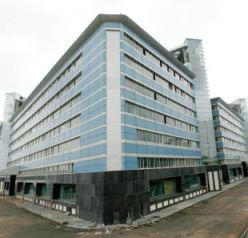BDB Radically Alters Diamond Sourcing for Retailers
May 01, 13
The Bharat Diamond Bourse (BDB) in Mumbai’s suburban Bandra-Kurla complex is now beginning to alter the way diamonds are sourced by Indian jewelry retailers. Major changes have already taken place.
During Dassera, which is considered auspicious for new beginnings, 37 diamond manufacturing firms moved their headquarters from the Opera House area in downtown Mumbai to the BDB.
Together with those who had moved earlier, this brought the total number of diamond firms operating from the BDB to 280. However, all of the offices operational in the BDB occupy only a fraction of the bourse's 2 million sq. ft. and represent just 11 percent of the BDB’s listed membership of 2,441. On the other hand, they are among the largest and most influential Indian diamond firms.
Most of these early movers also specialize in the larger size and better quality diamonds. This means that those wanting these goods have to source them from within the BDB, leading to changes not only in where business is done, but also in the way business has been done for many years.
|
|
One broker who specializes in putting together deals specifically for jewelry manufacturers – many small diamonds plus larger and better quality center-stones – said sourcing from the BDB would mean the exit of many smaller players and brokers. Declining to be identified, he said, “Today in Opera House, I can help multiple clients source their requirements from a variety of dealers simultaneously. As long as the dealer knows the client has come from me, I make a commission. I don’t have to be everywhere at once. In the BDB, unless I’m physically present during a transaction, there’s no commission.”
He claimed that multiple operations were essential to him because not every meeting between a diamond dealer and a buyer resulted in an actual transaction. “I can’t spend hours at a time with a single client who might not actually buy anything at the end of the day. I have to spread my options,” he told IDEX Online. He also felt that buying from the BDB tended to give sellers a slight edge in terms of pricing. “They know the buyer has exhausted his options in Opera House and so they can hold firm with prices,” he said.
Anoop Mehta, President of the BDB, emphatically states that all talk of BDB operations affecting pricing in any way is nonsense. “Essentially, diamond sourcing is now becoming more organized and systematic,” he said. “The buyer has a greater choice in one location. This might affect some exclusive seller-broker relationships, but overall it is good for business. Supply, demand and ready availability are the prime drivers of pricing – as they have always been.”
Mehta goes on to say that in any case, the BDB currently has minimal impact on domestic sourcing. “Some 60 percent of the goods for the northern markets – Delhi and the Punjab – are still sourced from the Opera House area. When domestic buyers come to the BDB, they are very clearly looking for larger goods and the more expensive qualities.”
Mehta noted that even though prominent small-goods specialists like Kiran Gems were now operating out of the BDB, in terms of the entire domestic consumption of smalls, they represented only a small fraction of the off-take. “The bulk of the sourcing for smalls still takes place in Opera House,” he observed.
Nevertheless, the move to the BDB is an ongoing process. Several firms made the move in November, over Diwali and a sizeable number intend to make the move in early 2013. According to the BDB President, between 50 and 60 more diamond firms are set to make the move to the BDB in the middle of January. “They will definitely change the sourcing dynamic,” he said.
Diamond dealers say that all other issues aside, the simple fact that operating out of a gated community will alter the security environment so much that business might become a lot freer if anything. The broker acknowledges this. “It will make a big difference in the way goods are shown to clients.
"A dealer with a buyer in his office will still call in goods from other manufacturers in order to ensure the completion of an order. In the Opera House area, there are clear limits to where I will go if I’m carrying goods. There are many deals I refuse simply because I don’t want to risk walking to an office that is some distance from Panchratna or Prasad Chambers (the two main buildings housing diamond offices in Opera House, VK). Within the BDB, there’ll be no concerns at all. I can get goods from a variety of manufacturers for the client to look at.”
Even so, many dealers say it took the July 2011 terrorist attack on Opera House and Zaveri Bazaar, the two ‘traditional’ gem and jewelry areas, to get the industry to take notice of the security situation. The BDB looked like a good place to be when viewed from this perspective.
Mehta notes that security apart, the single biggest impact of major operations out of the BDB will be the organization of the way diamonds are sourced and sold. That alone will generate confidence in the whole industry going forward into the future, he notes.
While personal relationships will always matter, an overall reliance on a dependable system rather than personalities will ensure that diamond buying becomes much easier even for small retailers. The stress of not knowing who exactly to go to should not keep a retailer from faraway Assam from coming to Mumbai to source the exact qualities and quantities of diamonds that he wants. The comfort of a dependable system is what is needed to set this right.
Originally published in IDEX India Retail January 2, 2013
